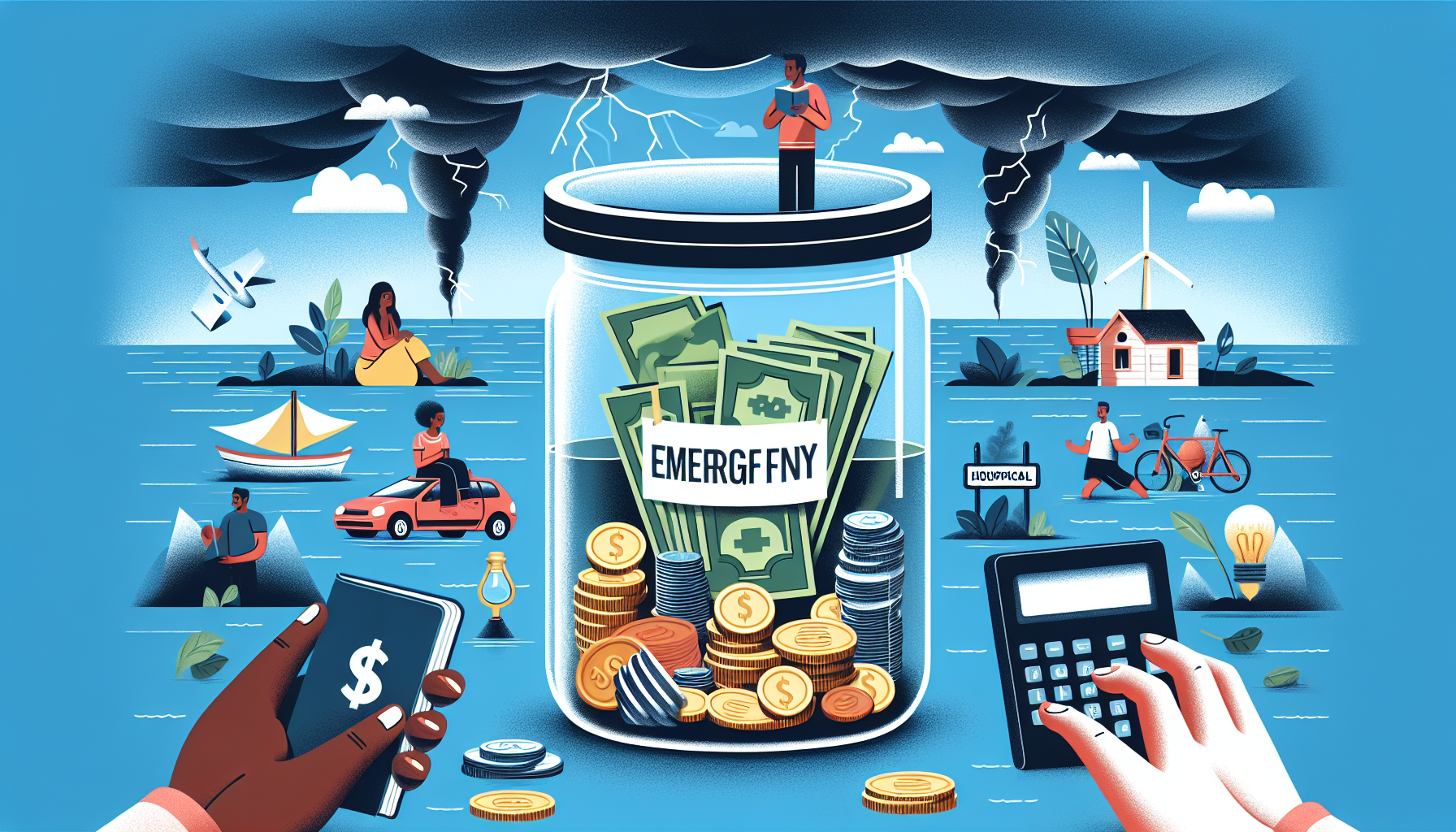Uncategorized
Why You Need An Emergency Fund: A Complete Guide to Financial Peace

Empower Your Future: Building a Robust Emergency Fund
In the realm of personal finance, the concept of an emergency fund stands as one of the pillars of sound financial planning. An emergency fund is not merely a savings account; it’s a financial buffer that guards against life’s unpredictability.
💡 What is an Emergency Fund?
An emergency fund is a dedicated reserve of money set aside to cover unexpected expenses, such as medical emergencies, car repairs, or sudden unemployment. Unlike general savings, this fund is built for the sole purpose of dealing with emergencies, offering relief when unforeseen situations arise.
✅ Benefits of Having an Emergency Fund
- Financial Security: Provides peace of mind by knowing you have a safety net.
- Reduces Stress: Eases financial anxiety and helps maintain focus on long-term goals.
- Avoids Debt: Prevents the need to rely on credit cards or loans, saving on interest costs.
📊 How Much Should You Save?
The recommended amount for an emergency fund is typically three to six months’ worth of living expenses. This range varies depending on individual circumstances, such as job stability and personal health considerations.
Steps to Building Your Emergency Fund
1. Assess Your Monthly Expenses
Calculate your monthly expenses, including rent, utilities, groceries, transportation, and essentials. Use this total to establish a target savings goal.
2. Set Up a Separate Savings Account
Keep your emergency fund separate from your everyday checking or savings accounts to avoid unintentional spending.
3. Automate Your Savings
Automating your savings ensures consistency. Set up a monthly direct deposit into your emergency fund to remove the temptation of spending.
🏡 Smart Strategies to Grow Your Emergency Fund
- Start Small: Begin with manageable contributions and gradually increase over time.
- Cut Expenses: Identify and trim non-essential expenses, redirecting these funds to your emergency savings.
- Utilize Windfalls: Allocate bonuses, tax refunds, or monetary gifts directly towards your fund.
🔍 Monitoring & Maintaining Your Fund
Regularly review your fund to ensure it aligns with your current lifestyle and financial obligations. Adjust the amount as necessary to maintain confidence that it covers potential emergencies.
🔗 Related FAQs
How quickly should I build my emergency fund?
While the timeline depends on your financial situation, aim to establish your fund as soon as possible. Prioritize saving and look for ways to accelerate the process by increasing your income or reducing expenses.
Can I invest my emergency fund?
It’s generally not advisable to invest your emergency fund in volatile assets like stocks or mutual funds. Opt for liquid and accessible options such as a high-yield savings account.
Your journey to financial security begins with a single step: creating an emergency fund. It’s a proactive measure that secures peace of mind, prepared for whatever life throws your way. Embark on this financial journey confidently, knowing that with each deposit, you’re building a shield against uncertainty.
Uncategorized
Mastering Financial Literacy: Empower Your Future Today!

Mastering Financial Literacy: Empower Your Future Today!
Financial literacy is more than just understanding numbers — it’s about making informed decisions that manifest in a secure and prosperous future. Whether you’re grappling with debt, learning how to budget effectively, or seeking ways to invest wisely, this guide is designed to empower you every step of the way.
Understanding Financial Literacy
Financial literacy encompasses the skills and knowledge that allow you to make informed and effective money-management decisions. It’s critical in developing responsible money habits and achieving financial independence.
Why Financial Literacy Matters
- Improves your ability to manage financial resources effectively for lifetime security.
- Enables informed financial decision-making.
- Enhances your ability to budget, save, and invest wisely.
Building a Budget That Works
Creating a budget is the cornerstone of financial stability. Follow these actionable steps to craft a budget that aligns with your goals and lifestyle:
Steps to Effective Budgeting
- Assess Your Income and Expenses: List all your income sources and monthly expenses. Be thorough!
- Set Clear Goals: Establish short-term and long-term financial goals. This will guide your budget priorities.
- Create a Plan: Allocate funds to each expense category, ensuring essential costs are covered first.
- Monitor and Adjust: Regularly review your budget and make adjustments as needed to meet your goals.
Strategies to Effectively Manage Debt
Debt can be a significant hurdle to financial freedom. Implement these strategies to manage and eliminate debt effectively:
Debt Reduction Techniques
- Debt Snowball Method: Pay off smallest debts first to build momentum.
- Debt Avalanche Method: Tackle high-interest debts first to minimize cost over time.
- Consider Consolidation: Streamline payments with a debt consolidation loan if it reduces interest rates and costs.
Investing for Long-term Wealth
Investing is a powerful tool for building wealth over time. Start early and consider these smart strategies:
Investment Tips
- Diversify Your Portfolio: Spread investments across different asset types to mitigate risk.
- Contribute Regularly: Set up automatic contributions to investment accounts.
- Educate Yourself: Continuously learn about markets and instruments to refine your strategy.
FAQs on Financial Literacy
- What is financial literacy and why is it important? Financial literacy involves understanding and using various financial skills effectively. It’s crucial for making sound financial decisions and achieving independence.
- How can I start learning about personal finance? Begin by reading articles, books, and taking online courses focused on budgeting, saving, and investing.
- What are some basic investing tips for beginners? Start with setting clear goals, learning about different investment vehicles, and considering working with a financial advisor if needed.
Mastering financial literacy is a journey. By applying these principles, you’ll not only gain control over your finances but also pave the path to a more secure and prosperous future. 💸
Uncategorized
SEO-optimized title that sparks curiosity and delivers value

Write a well-structured blog article of up to 5000 words, fully optimized for SEO. The content should be geared toward readers who want to improve their financial life — whether they’re paying off debt, learning how to budget, saving for the future, or exploring smart ways to invest and protect their income.
Focus on practical advice, responsible money habits, and easy-to-follow strategies that help people build lasting financial stability, regardless of their current income or experience.
⚙️ Apply SEO techniques:
Use
and
subheadings with the main keyword and natural variations
Include checkmark ✅ or bullet lists where helpful
End with a FAQ block answering real and common questions on the topic
Use emojis 💸📊🏡 where appropriate to keep the tone friendly and relatable
Make sure the article is accurate, up-to-date, and formatted in clean HTML. Maintain a clear, accessible, and empowering tone. Deliver content with authenticity, financial responsibility, and encouragement. Help the reader take control of their money, build confidence, and make informed decisions that support their future.
Uncategorized
Unlock Financial Success: Essential Personal Budgeting Strategies You Need to Know

Write a well-structured blog article of up to 5000 words, fully optimized for SEO. The content should be geared toward readers who want to improve their financial life — whether they’re paying off debt, learning how to budget, saving for the future, or exploring smart ways to invest and protect their income.
Focus on practical advice, responsible money habits, and easy-to-follow strategies that help people build lasting financial stability, regardless of their current income or experience.
⚙️ Apply SEO techniques:
Use
and
subheadings with the main keyword and natural variations
Include checkmark ✅ or bullet lists where helpful
End with a FAQ block answering real and common questions on the topic
Use emojis 💸📊🏡 where appropriate to keep the tone friendly and relatable
Make sure the article is accurate, up-to-date, and formatted in clean HTML. Maintain a clear, accessible, and empowering tone. Deliver content with authenticity, financial responsibility, and encouragement. Help the reader take control of their money, build confidence, and make informed decisions that support their future.
-

 Fashion8 anos ago
Fashion8 anos agoThese ’90s fashion trends are making a comeback in 2017
-

 Entertainment8 anos ago
Entertainment8 anos agoThe final 6 ‘Game of Thrones’ episodes might feel like a full season
-

 Fashion8 anos ago
Fashion8 anos agoAccording to Dior Couture, this taboo fashion accessory is back
-

 Entertainment8 anos ago
Entertainment8 anos agoThe old and New Edition cast comes together to perform
-

 Sports8 anos ago
Sports8 anos agoPhillies’ Aaron Altherr makes mind-boggling barehanded play
-

 Business8 anos ago
Business8 anos agoUber and Lyft are finally available in all of New York State
-

 Entertainment8 anos ago
Entertainment8 anos agoDisney’s live-action Aladdin finally finds its stars
-

 Sports8 anos ago
Sports8 anos agoSteph Curry finally got the contract he deserves from the Warriors



